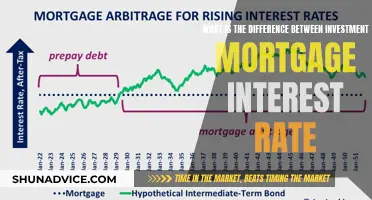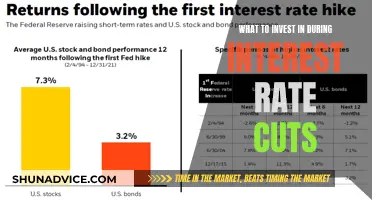
Rising interest rates can have a significant impact on investment. When interest rates go up, consumer spending and demand tend to decline, which can cause stock prices to drop. This is because rising interest rates curb inflation, while declining interest rates tend to speed it up. As a result, some investors may choose to avoid the risk of investing in stocks and instead opt for safer options, such as savings accounts, which offer higher returns when interest rates are high.
| Characteristics | Values |
|---|---|
| Bond prices | When interest rates rise, bond prices typically fall |
| Consumer spending | When interest rates rise, consumer spending declines |
| Demand | When interest rates rise, demand declines |
| Inflation | When interest rates rise, inflation is tempered |
| Stock prices | When interest rates rise, stock prices drop |
| Business spending | When interest rates rise, businesses cut back on spending |
| Earnings | When interest rates rise, earnings fall |
| Savings | When interest rates rise, individuals see a higher return on their savings |
| Risk | When interest rates rise, investing in stocks is seen as less attractive |
What You'll Learn

The impact of rising interest rates on bond prices
When interest rates rise, bond prices typically fall. This is a fundamental principle of bond investing, which leaves investors exposed to interest rate risk. This is the risk that an investment's value will fluctuate due to changes in interest rates.
The relationship between interest rates and bond prices can be confusing at first, but it's important to understand so you can make informed investment decisions when considering bonds and other fixed-income products. If you intend to hold the bond to maturity, interest rate risk may be less of a concern for you. This is because you would not be forced to sell the bond before it reaches maturity at a discount to par value, or below the bond's initial purchase price.
Rising interest rates also curb inflation, while declining interest rates tend to speed it up. When interest rates decline, consumers spend more as the cost of goods and services is cheaper. Increased consumer spending means an increase in demand, and an increase in demand increases prices. But when interest rates rise, consumer spending and demand decline, and inflation is somewhat tempered.
Rising or falling interest rates also affect consumer and business psychology. When interest rates are rising, both businesses and consumers will cut back on spending. This will cause earnings to fall and stock prices to drop. On the other hand, when interest rates have fallen significantly, consumers and businesses will increase spending, causing stock prices to rise.
Low-Interest Rates: Where to Invest for Maximum Returns
You may want to see also

How rising interest rates affect consumer and business psychology
Rising interest rates affect consumer and business psychology in a number of ways. When interest rates rise, both businesses and consumers will cut back on spending. This will cause earnings to fall and stock prices to drop.
In general, rising interest rates hurt the performance of stocks. If interest rates rise, individuals should see a higher return on their savings. This removes some of the incentive to take the risk of investing in stocks.
Rising interest rates also curb inflation, while declining interest rates tend to speed it up. When interest rates decline, consumers spend more as the cost of goods and services is cheaper. Increased consumer spending means an increase in demand, and an increase in demand increases prices.
Some sectors benefit from interest rate hikes. Banks, brokerages, mortgage companies, and insurance companies' earnings often increase as interest rates move higher because they can charge more for lending money.
Investments with 10% Compound Interest: Where to Start?
You may want to see also

The effect of rising interest rates on stock prices
Rising interest rates have a negative impact on stock prices. When interest rates rise, consumer spending and demand decline, and inflation is tempered. This causes earnings to fall and stock prices to drop.
When interest rates rise, individuals will see a higher return on their savings. This removes some of the incentive to take the risk of investing in stocks.
However, some sectors benefit from interest rate hikes. Banks, brokerages, mortgage companies, and insurance companies' earnings often increase as interest rates move higher because they can charge more for lending money.
Additionally, some stocks will do better than others as interest rates increase. Consumer staples like soap and cereal will still sell pretty much as usual.
Understanding Interest Expense: Carry Forward Rules for Investors
You may want to see also

How rising interest rates can hurt the performance of stocks
Rising interest rates can hurt the performance of stocks in several ways. Firstly, when interest rates rise, consumer spending and demand decline. This causes earnings to fall and stock prices to drop. Consumers may also be incentivised to save more money, reducing the incentive to take the risk of investing in stocks.
Additionally, rising interest rates can impact the psychology of both businesses and consumers, causing them to cut back on spending. This can lead to a decrease in stock prices and a potential market tumble, even before the rate increase officially takes place.
The relationship between interest rates and stock prices is complex, and some sectors may benefit from interest rate hikes. For example, the financial industry, including banks, brokerages, mortgage companies, and insurance companies, may experience increased earnings as they can charge more for lending money.
It's important for investors to understand the impact of rising interest rates on their portfolios and to consider the potential risks and benefits of different investment options.
The Magic Interest Rate to Double Your Money
You may want to see also

The impact of rising interest rates on the financial industry
Rising interest rates can have a significant impact on the financial industry. When interest rates rise, consumer spending and demand decline, and inflation is tempered. This causes earnings to fall and stock prices to drop. However, some sectors benefit from interest rate hikes. Banks, brokerages, mortgage companies, and insurance companies' earnings often increase as interest rates move higher because they can charge more for lending money.
Interest rates and bond prices often move in opposite directions. When interest rates rise, bond prices typically fall, and vice versa. This leaves investors exposed to interest rate risk, which is the risk that an investment's value will fluctuate due to changes in interest rates. As an investor, it is important to understand the relationship between bonds and interest rates, especially considering that bonds can be an important component of a diversified portfolio.
Rising interest rates can also affect consumer and business psychology. Both businesses and consumers will cut back on spending when interest rates are rising. This can cause earnings to fall and stock prices to drop, and the market may tumble in anticipation of an interest rate rise.
In general, rising interest rates hurt the performance of stocks. Individuals may see a higher return on their savings, removing some of the incentive to take the risk of investing in stocks. However, some stocks will do better than others as interest rates increase. Consumer staples like soap and cereal will still sell pretty much as usual, while luxury cars, for example, may not sell as well.
The Best Brazilian Teams to Invest In
You may want to see also
Frequently asked questions
When interest rates rise, consumer spending and demand decline. This causes earnings to fall and stock prices to drop.
Bond prices typically go down when interest rates rise. This is a fundamental principle of bond investing, which leaves investors exposed to interest rate risk.
Banks, brokerages, mortgage companies, and insurance companies' earnings often increase as interest rates move higher because they can charge more for lending money.







